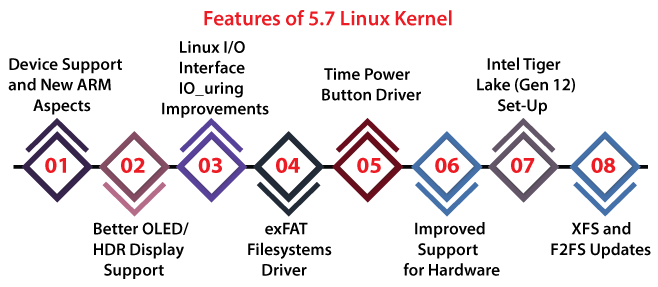
Some distros (like Arch) issue new kernel updates relatively quickly, but others (like Ubuntu) don’t.
CURRENT LINUX KERNEL VERSION CODE
Linux 6.0 is available to download as source code right now, which you can compile by hand on your distro of choice? Not up for that? Wait for your distro maintainer to package the do the half graft instead.

I recommend checking out Phoronix’s feature overview for top-level info, or diving in to the comprehensive LWN merge report 1 and LWN merge report 2 for more detail. Plus, as you can imagine, a whole lot more. Kernel support for NVMe in-band authentication.Other assorted changes in Linux 6.0 include: These make it possible to get or set the UUID stored in a filesystem superblock. Ubuntu’s default file system remains ext4, so I wanted to mention that Linux 6.0 enables two new ioctl() operations: EXT4_IOC_GETFSUUID and EXT4_IC_SETFSUUID. New hardware supported includes XP-PEN Deco L drawing tablet, a swathe of sensors on AMD motherboards, including Sensor Fusion Hub support on newer Ryzen laptops, and functional Thunderbolt on Intel Raptor Lake. Talking of laptops Linux enthusiasts use, some TUXEDO Computers and Clevo laptops had issues with touchpads and keyboard when resuming from suspend in earlier kernel versions. The ThinkPad X13s is pre-loaded with Windows 11 for ARM but, with Linux support now in the formative stages, this could be a great reference device for Linux ARM enthusiasts. The (expensive) Lenovo ThinkPad X13s laptop, which runs on the Qualcomm Snapdragon 8cx Gen3, starts to pick up support. RISC-V also ships with a new default configuration capable of running Docker from the get-go. Those noticing keyboard issues on Ryzen 6000 series laptop should, if using Linux 6.0, find things once-again function as expected.īoth the OpenRISC and LoongArch architectures gain support for PCI buses, while RISC-V buffs up its cache block management capabilities using a number of new extensions, including the “Zicbom” extension.

CURRENT LINUX KERNEL VERSION DRIVER
This include support for Intel’s fourth generation Xeon server chips “Sapphire Rapids”, and their 13th generation “Raptor Lake” core chips.ĪMD provides a kernel graphics driver for their RDNA 3 GPU, land a new audio driver for AMD ‘Raphael’ platforms and improve the audio support for AMD ‘Jadeite’ systems. Linux 6.0 also does some mandatory future-proofing by laying groundwork for swathes of upcoming hardware. Seeing Linux squeeze more power while using less power is always a welcome one. Benchmarking done by Phoronix reveals appreciable performance improvements across Intel Xeon ‘Ice Lake’, AMD Ryzen ‘Threadripper’, and AMD EPYC processors thanks to scheduler changes and other kernel energy tweaks.


 0 kommentar(er)
0 kommentar(er)
